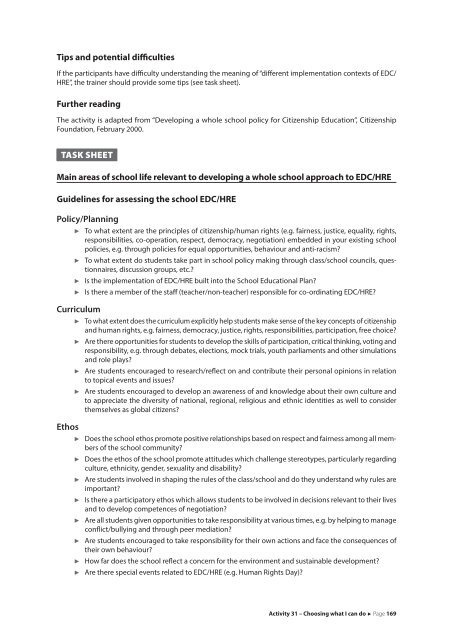TASKs for democracy
4NYw4W
4NYw4W
Create successful ePaper yourself
Turn your PDF publications into a flip-book with our unique Google optimized e-Paper software.
Tips and potential difficulties<br />
If the participants have difficulty understanding the meaning of “different implementation contexts of EDC/<br />
HRE”, the trainer should provide some tips (see task sheet).<br />
Further reading<br />
The activity is adapted from “Developing a whole school policy <strong>for</strong> Citizenship Education”, Citizenship<br />
Foundation, February 2000.<br />
TASK SHEET<br />
Main areas of school life relevant to developing a whole school approach to EDC/HRE<br />
Guidelines <strong>for</strong> assessing the school EDC/HRE<br />
Policy/Planning<br />
To what extent are the principles of citizenship/human rights (e.g. fairness, justice, equality, rights,<br />
responsibilities, co-operation, respect, <strong>democracy</strong>, negotiation) embedded in your existing school<br />
policies, e.g. through policies <strong>for</strong> equal opportunities, behaviour and anti-racism?<br />
<br />
<br />
<br />
To what extent do students take part in school policy making through class/school councils, questionnaires,<br />
discussion groups, etc.?<br />
Is the implementation of EDC/HRE built into the School Educational Plan?<br />
Is there a member of the staff (teacher/non-teacher) responsible <strong>for</strong> co-ordinating EDC/HRE?<br />
Curriculum<br />
To what extent does the curriculum explicitly help students make sense of the key concepts of citizenship<br />
and human rights, e.g. fairness, <strong>democracy</strong>, justice, rights, responsibilities, participation, free choice?<br />
<br />
<br />
<br />
Are there opportunities <strong>for</strong> students to develop the skills of participation, critical thinking, voting and<br />
responsibility, e.g. through debates, elections, mock trials, youth parliaments and other simulations<br />
and role plays?<br />
Are students encouraged to research/reflect on and contribute their personal opinions in relation<br />
to topical events and issues?<br />
Are students encouraged to develop an awareness of and knowledge about their own culture and<br />
to appreciate the diversity of national, regional, religious and ethnic identities as well to consider<br />
themselves as global citizens?<br />
Ethos<br />
<br />
<br />
<br />
<br />
<br />
<br />
<br />
<br />
Does the school ethos promote positive relationships based on respect and fairness among all members<br />
of the school community?<br />
Does the ethos of the school promote attitudes which challenge stereotypes, particularly regarding<br />
culture, ethnicity, gender, sexuality and disability?<br />
Are students involved in shaping the rules of the class/school and do they understand why rules are<br />
important?<br />
Is there a participatory ethos which allows students to be involved in decisions relevant to their lives<br />
and to develop competences of negotiation?<br />
Are all students given opportunities to take responsibility at various times, e.g. by helping to manage<br />
conflict/bullying and through peer mediation?<br />
Are students encouraged to take responsibility <strong>for</strong> their own actions and face the consequences of<br />
their own behaviour?<br />
How far does the school reflect a concern <strong>for</strong> the environment and sustainable development?<br />
Are there special events related to EDC/HRE (e.g. Human Rights Day)?<br />
Activity 31 – Choosing what I can do Page 169


